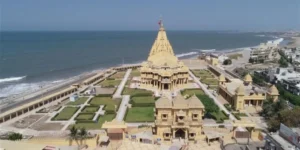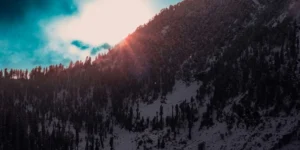High up in Kinnaur, where the Baspa River sparkles and snow-capped peaks stand tall, lies Chitkul, a tiny village with a big heart and old Himachali stories. The beauty of Chitkul lies in the fact that it is one of the remotest villages in India. If you dream of slow mornings, wood-smoke, and apple blossoms, or waking up with Himalayan views that make you forget city chaos, maybe it’s time to take the long road north. Chitkul is not just a place, it’s a spirit.
Getting to Chitkul
To reach Chitkul, you have to go via Delhi or Shimla.
- Delhi to Chitkul: Be ready for a long but scenic journey. The road distance is about 590 km. If you drive, expect about 16-17 hours on the road, including a halt at Shimla or Sangla to rest. Some split the trip: Delhi to Shimla (about 350km, 8–9 hours), then onward to Chitkul via Narkanda, Rampur, Jeori, Karcham, and Sangla (another 240km over 10–12 hours).
- Shimla to Chitkul: Around 238 kilometers by car or cab, the drive takes about 10–12 hours, but it’s absolutely worth every twist and turn. You’ll see shifting terrains, pine forests, apple orchards, river valleys; each bend opening to a fresh sky.
Flights to Shimla (Jubbarhatti) make things easier, but direct buses and trains won’t get you here. If you rely on public transport, plan for a few changes: Himachal buses to Sangla and then a cab to Chitkul.
Pro tip: Acclimatise at Sangla or Reckong Peo if coming directly from the plains. Chitkul is at 3,450 metres so take your time and carry Camphor as oxygen levels can be low, making it difficult to breathe.
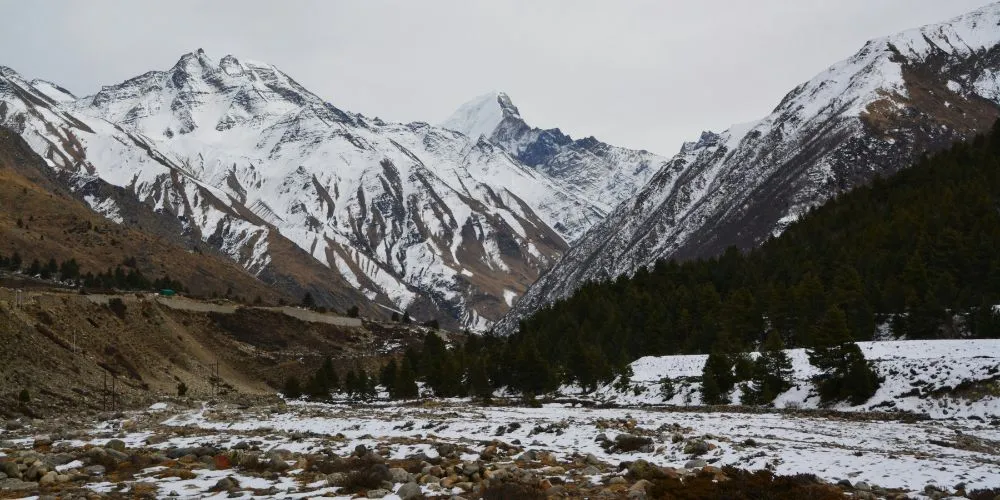
Best Time to Visit Chitkul
Though Chitkul is a magical land that can be visited round the year, you can plan ahead as per the seasons mentioned below to pick the best suited time for you:
- Summer (May-June): The valley glows in green and gold, and the Baspa runs wild. Daytime temperatures gently hover at 5–15°C; nights get chilly. Great for treks, riverside walks, and feasting on mountain sunshine.
- Monsoon (July-September): The greenest months, but be wary. Landslides are possible; check the road before you go. If you reach, misty mornings and quiet valleys wait for you.
- Autumn (October-November): Hills turn russet, the crowds thin, and the sky goes impossibly blue. Temperatures drop to 0°C by night; pack woollens. If you love clear skies and calm, this is your season.
- Winter (December-April): Chitkul turns into a frozen fairy tale, with temperatures dipping to -20°C. Snow cloaks everything, some guesthouses close, and it takes good planning (and heavy jackets) to survive. But if you’re after snow and silence, then this is your season to visit Chitkul.
For first-timers, May-June and September-October promise the best experience, pleasant weather, open roads, and happy locals.
Where to Stay: Hotels in Chitkul
You won’t find five-star luxury, but that’s half the charm. Chitkul has cheerful homestays, eco-camps, and budget guesthouses. Some good picks are:
- Zostel Chitkul: Cozy beds, late-night food, mountain views; even electric blankets and heating for those cold nights.
- The Wanderer’s Nest: Local hospitality and family feel; perfect for people who like to swap stories over tea.
- Panaash Eco World: Glamping with domes, heaters, and all the comforts you never expected at this altitude.
- Kinnor Retreat: Simple, scenic rooms right in the village.
- Sangla Valley Camping: This one is for families and budget travellers, tented camps with stunning valley views.
Peak season (summer, autumn) means rush; book early. For winter travel you must call ahead to check which stays are open and plan accordingly.
Chitkul’s Must-Experience Spots
- Baspa River: The heart of Chitkul, flowing blue and cold. Dip your feet, picnic by its banks, or follow nature trails as birds and butterflies flutter by.
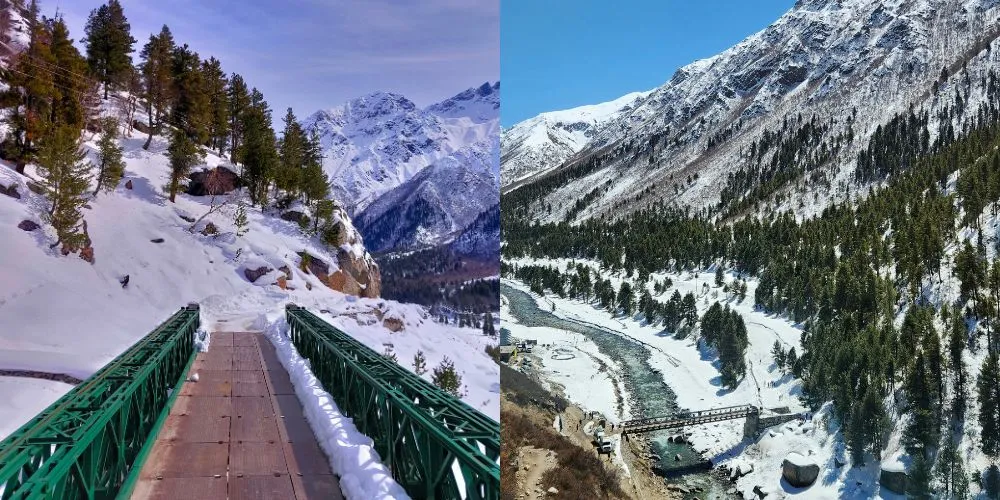
Baspa River
- Sangla Meadows: A stone’s throw from Chitkul, these meadows will make you gape at Kinner Kailash, apple orchards, and little local houses. Go trekking, take photos, or just lie back and stare at the sky.
- Mathi Devi Temple: Chitkul’s oldest spiritual spot. Visit the temple for wood-carved doors, fluttering prayer flags, and a wish for safe journeys.
- A Walk through Village Life: Stroll into the last inhabited village before Tibet. Smile at old grannies, buy homemade pickles, or help chop wood if you feel like it.
- Akhri Dhaba: The “Last Dhaba of India,” right on the road out of Chitkul. Eat rajma-chawal, drink spicy chai, and chat with other wanderers; everyone here has a story.
- Batseri Village: On the way from Sangla, witness this village full of apple orchards and Tibetan-influenced architecture. Worth a stop just for the peace and admiration.
Trekking: Lamkhaga pass, Borasu pass, and Charang Chitkul pass treks all call for adventure lovers. Most trails start from the village; local guides can help you plan and guide you regarding what to carry as well as how to prepare.
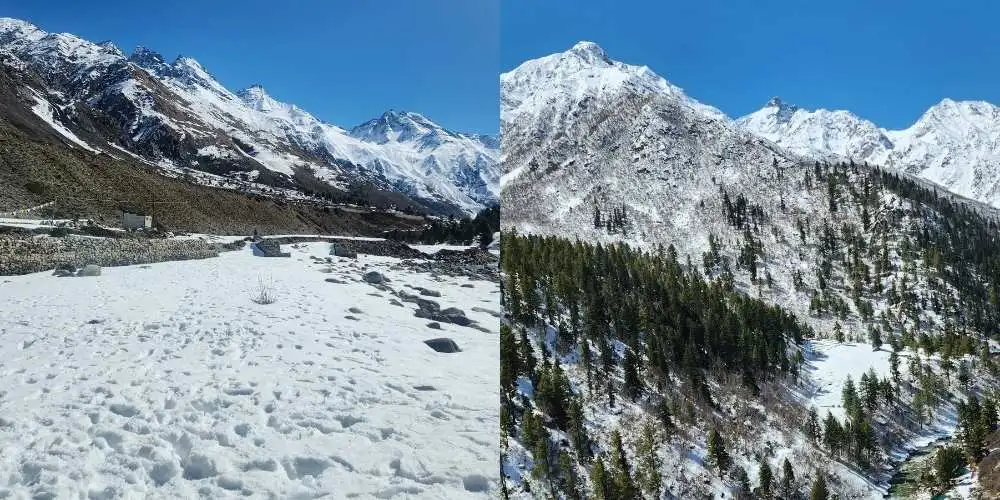
Culture and Heritage
Chitkul isn’t just about scenery. The Kinnauris are warm and proud, their lives shaped by high-altitude weather and ancient customs. You’ll see houses with slate roofs, wooden balconies, flower beds on sills, and prayer wheels at crossroads.
Food is simple, dal, rajma, fresh breads, and endless apples. If you’re lucky, you’ll be invited in for butter tea or a local celebration.
Take it slow. The cold air, the old stories, the timeless rhythms; everything here makes you breathe easy.
Travel Tips for Newbies
- Pack smart: Heavy jackets, layers, sunglasses, and sturdy shoes. Nights and mornings are cold, even in May.
- Cash: Keep some handy. ATMs might not work, and cards aren’t accepted everywhere.
- Connectivity: Mobile networks are patchy. Trust the old ways; write down your family’s phone number before arrival.
- Health: Acclimatise; don’t rush. Drink lots of water, skip too much alcohol, and give yourself a day to adjust.
- Respect: Take back your litter. Locals are proud of their clean valley.
Why Chitkul is Special
If you’re tired of the same crowded hill stations, Chitkul gives you something different. A place where the views are endless, the people are kind, and every day feels like a gift from the gods. Whether you walk, read, chat, or just stare at the clouds sailing by, you’ll find peace here.
So, pack your bags, plan your route; Delhi or Shimla to Chitkul, as you like; and discover a piece of India’s heritage, beauty, and soul. Come for a few days; you might stay forever in your heart.
By: Anushka Singhal


